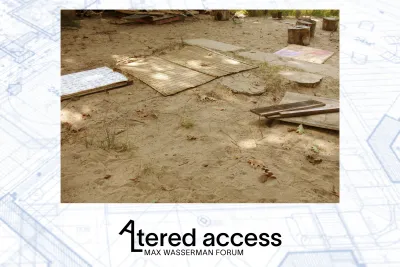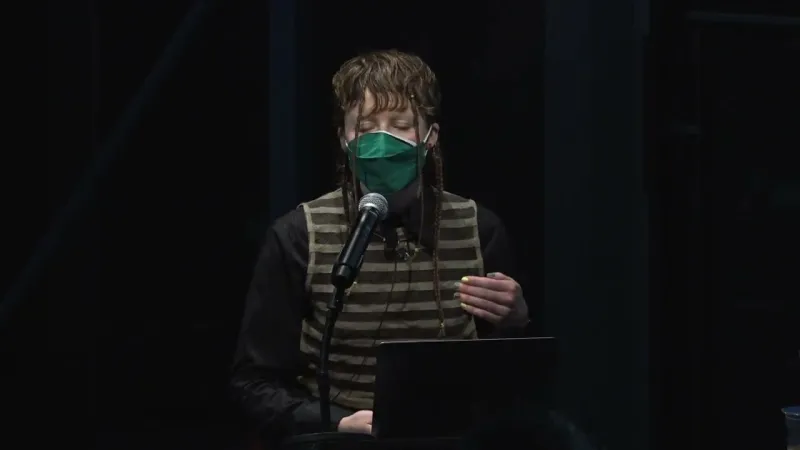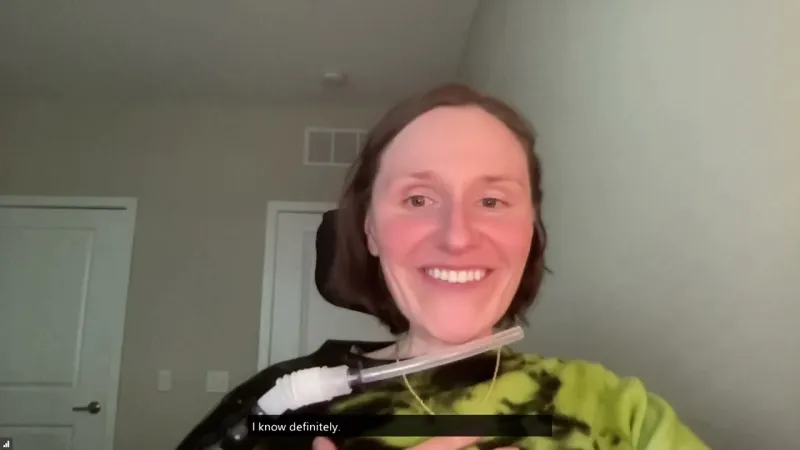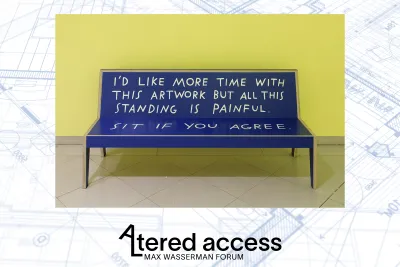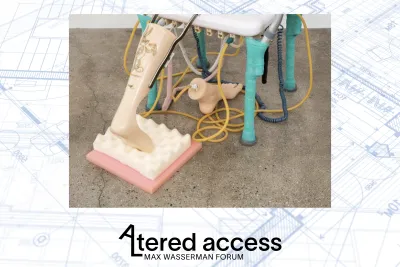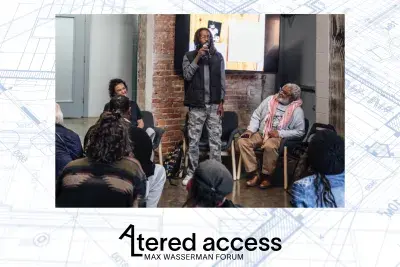Park McArthur, How to get a wheelchair over sand, 2013, 8.5 x11 inches, C-print.
Wasserman Forum: Altered Access Opening Night
To attend opening night virtually, please navigate to the livestream link at 5:30 PM on Friday, April 21.
Evening Schedule
Welcome and Introduction
5:30 PM EST
Paul Ha, Director, MIT List Visual Arts Center
Emily A. Garner, Senior Manager, Campus and Public Programs, MIT List Visual Arts Center
Building What Doesn't Harm: Emily Barker
6:00 PM EST
Live Presentation and Live-streamed
Setting the stage for this forum, Emily Barker will consider the built environment, economic systems, and societal norms that are damaging and inadequate for every person, plant, and animal on earth. Noting that we are all inseparable and dealing with the same brittle foundations for life, Barker questions how we inhabit notions of healing.
Emily Barker is an artist living in Los Angeles. They were born in 1992 in San Diego, grew up in Georgia, and studied at the School of the Art Institute of Chicago. They showed in the 2022 Whitney Biennial and at Museum für Moderne Kunst, Frankfurt, and recently had their second solo show at Carlye Packer gallery. They’ve given artist talks at the Whitney Museum of American Art, New York; University of California, Los Angeles; the Royal Academy of Art, London; Otis College of Art and Design, Los Angeles; and others. They have been highlighted in over thirty pieces of press and featured in Dazed 100, Hyperallergic’s 2021 Culture Shifters, Vogue, and a documentary on their practice for PBS’s Artbound by Dolly Li.
Keynote Address: Park McArthur
6:30–7:30 PM EST
Virtual Presentation
Park McArthur is an artist who experiments with personal and social meanings of debility, delay, and dependency under the guidance and instruction of disability. McArthur’s artwork and teachings center care and access and explore ongoing relationships with buildings, structures, and spaces.
With Constantina Zavitsanos, McArthur has exhibited artworks and published texts in Women and Performance: A Journal of Feminist Theory and Trap Door: TransCultural Production and the Politics of Visibility. Recent solo exhibitions include Kunsthalle Bern, Switzerland; Maxwell Graham/Essex Street, New York; the Museum of Modern Art, New York, and in 2019, McArthur joined the Department of Art and Design at Rutgers University, New Jersey, as Tepper Family Endowed Chair.
About Altered Access
Altered Access brings together artists, educators, and curators to discuss current disability discourse within the arts and museum institutions. The Americans with Disability Act (the civil rights law signed in 1990) prohibits discrimination against those with a disability; however, inadequacies have persisted. A rise in disability studies and crip theory—a contemporary discourse at the intersection of disability and queer studies, which indicates the complexity of disabled experience in a world built for able-bodies—emerged in the mid-1990s to early 2000s, and this academic thinking has played a pivotal role in influencing institutions on a broader level. Museums work within an institutional model, but they also have a duty to bring artist voices to the forefront and be considered safe spaces for critical discourse. What if access thinking was integrated into the installation of artworks and the creation of programs at the initial stages rather than as an afterthought? What critical questions, experimentation, and creative thought could be assimilated into these preliminary phases? This forum will center voices in the arts and disability practice to consider aspects of digital and spatial design and museums as places of healing. It will also explore other creative approaches that implement accessible, inclusive practices, which every organizational and institutional model can apply in developing a fresh look at how disabled artists, audiences, and museums can work together.
The Max Wasserman Forum
The Max Wasserman Forum on Contemporary Art was established in memory of Max Wasserman (MIT Class of 1935), a founding member of the Council for the Arts at MIT. This public forum was endowed through the generosity of the late Jeanne Wasserman and addresses critical issues in contemporary art and culture through the participation of renowned scholars, artists, and arts professionals. The Forum is organized and presented by the MIT List Visual Arts Center.
